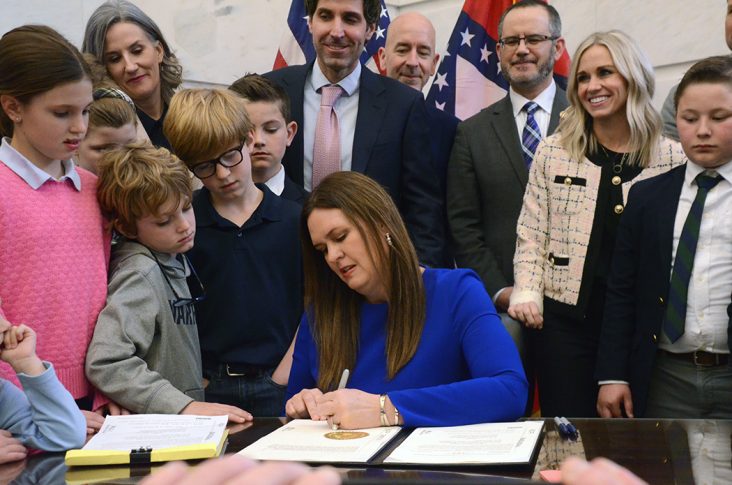Governor signs LEARNS Act; rulemaking process begins
by March 8, 2023 4:21 pm 4,106 views

Gov. Sarah Sanders signs the LEARNS Act into law.
Gov. Sarah Sanders signed into law Wednesday (March 8) what she called “the biggest, boldest, most conservative education reforms in our history,” setting in motion a remaking of Arkansas education that will require an extensive rulemaking process.
Sanders signed the LEARNS Act into law in the second floor of the Capitol Rotunda flanked by legislators, including the bill’s primary sponsors, Sen. Breanne Davis, R-Russellville, and Rep. Keith Brooks, R-Little Rock.
“I’m proud that the bill I’m about to sign is the largest overhaul of our state’s education system in Arkansas history because it frankly could not get here soon enough,” Sanders said. “We’ve seen how the status quo condemns Arkansans to a lifetime of poverty, and we’re tired of sitting at the bottom of national education rankings.”
Among its many provisions, the 145-page bill will increase minimum teacher salaries to $50,000 and establish “education freedom accounts,” giving families access to state per-pupil foundation funding to use for non-public schooling.
Before signing the bill, Sanders described a boy who “doesn’t fit neatly in the one-size-fits-all model that our current system provides.”
She said he had struggled with numerous learning disabilities but did not get the help he needed from his public school district. She said he was bullied and fell behind academically until he ran away from school twice. He ran away a third time after a bully told him to “go and die in a ditch.” Her voice briefly choking, Sanders said he was found alone, soaking wet and sobbing in a ditch.
She said the parents saved money and moved him to a specialized school where he is thriving.
“But for every little boy whose parents can find a way to send him to another school, there are hundreds who cannot,” he said. “We’ve been failing them, not just in school but in life.”
Sanders said research has shown that when school choice policies are implemented, most families choose public schools, which improves because of the competition they face.
She said that by raising the minimum teacher salary to $50,000, Arkansas would go from 48th to the top five in that measurement.
Under the LEARNS Act, third graders who fail to score proficient in literacy will be held back, with exceptions, but the bill also provides increased support. She said the bill makes a “massive investment” with 120 literacy coaches throughout the state and $500 tutoring grants for struggling students.
Secretary of Education Jacob Oliva will be tasked with leading the rulemaking process and then implementing the law.
“While we have taken the first big step on our journey, we have not arrived,” he said in his brief remarks before the bill signing. “I look forward to continuing to work with educators, leaders, legislators, families and students as we begin the implementation process.”
Oliva told reporters afterward that the bill signing lets the State Board of Education begin to develop rules and processes for implementing it into law. He said the Department of Education would “act with urgency” and has already set some internal deadlines in advance of the July 1 date required for many rules going into effect for 2024.
Oliva said “guardrails for accountability” would be put in place for the education freedom accounts. Still to be developed are the application processes for families to access the accounts as well as a process for determining private schools’ accreditation requirements. The bill requires those schools to test students through a process that also must be developed. A system will have to be developed to transfer funds from state agencies to private education providers.
Oliva said the process would be made easier because Arkansas already has the Succeed Scholarship program, which provides private school scholarships to students with disabilities and others.
“So we’re just going to take what we already have, see if we can expand it to look at the phased-in, tiered approach that the bill allows,” he said.
He said rules would be developed transparently. Department of Education leaders will be meeting with school district leaders and has put out a call for volunteers to serve on six work groups covering topics such as school safety, improving teaching and learning, and implementing the school choice component. On Friday, Oliva is scheduled to meet with about 15 superintendents in Northwest Arkansas.
“We’ve identified some of the themes that have emerged from the bill,” he said. “We’re going to put the educators and experts and the leaders of the districts who have their boots on the ground together, sit around a table. We’re going to be clear, transparent, make sure everybody has an opportunity to provide feedback and get that work going right away.”
The final version of the bill passed 78-21 in the House and 26-8 in the Senate, with almost all Republicans voting yes and all Democrats voting no.
After the bill’s signing, the Democratic Party of Arkansas issued a press release with critical statements from Senate Minority Leader Greg Leding, D-Fayetteville, and House Minority Leader Tippi McCullough, D-Little Rock.
Party Chairman Grant Tennille said in the release that he had discussed the bill with “a few very well-known attorneys who are already at work on a lawsuit.”
